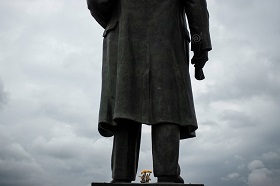The detention in Belarus of a plane operated by the Irish company Ryanair has caused a sharp reaction in the US and the EU. The issue of expanding sanctions was again on the agenda. They may turn out to be even more serious than the restrictive measures introduced last year in response to the situation around the presidential elections. There are five main sanctions risks for Belarus.
The first risk is that of a ban on the use of the territory of Belarus for aircraft transit, a ban on flights to Belarus, as well as on the reception of aircraft from Belarusian airlines. Threats quickly began to shift to a practical level.
The second risk is that of diplomatic sanctions.
The third risk is the denial of EU investment programmes. The government of Belarus would hardly receive such assistance even without the incident with the plane. The condition of assistance is a democratic transition in the country.
The fourth risk is another wave of sanctions against Belarusian officials. Such sanctions were widely used in response to the events in 2020. They play a rather symbolic role and do not do much economic harm.
Finally, the fifth risk is that of blocking sanctions against strategic enterprises. Such sanctions have also been used in the past. A number of large Belarusian enterprises are already in the sanctions list (SDN) of the US Treasury. Most of them have a general license. Previously, such licenses were extended for long periods (up to two years). However, in April, the license was renewed for only a month and a half. It expires on June 2, 2021. Will the US, and after them the EU, carpet bomb the Belarusian economy? The lifting of the exemptions and the renewal of sanctions would cause serious economic damage. However, the threat of such actions will remain inevitable.
The detention in Belarus of a plane operated by the Irish company Ryanair has caused a sharp reaction in the US and the EU. The issue of expanding sanctions was again on the agenda. They may turn out to be even more serious than the restrictive measures introduced last year in response to the situation around the presidential elections.
The approach of Washington and Brussels is defined by several lines of argument which converge at one point. First, the detention of the plane resulted in the arrest of opposition politician Roman Protasevich. The incident reignited the theme of democracy and human rights violations, which have long served as a basis for sanctions. Second, the Western powers proceed from the fact that the aircraft was detained under the false pretext of a terrorist attack threat on board. The statements of the Hamas movement that they were not involved in the events added their share of farce. Third, the detention was carried out with the use of an Air Force fighter, that is, this aspect of the incident can be interpreted as the use of force. History knows a number of examples of such detentions, including the forced landing of Bolivian President Evo Morales’ plane in Vienna in 2013. From a formal point of view, Minsk acted in the interests of national security within Belarusian territory. However, this formality and the existence of precedents are unlikely to play a serious role. In the USA, the incident is understood as a “shocking act” that endangered the lives of passengers and has served as a new reason to condemn Lukashenko for undermining democracy. Similar assessments were given in Brussels and London. Threats of new sanctions were voiced almost immediately. There are five main sanctions risks for Belarus.
The first risk is that of a ban on the use of the territory of Belarus for aircraft transit, a ban on flights to Belarus, as well as on the reception of aircraft from Belarusian airlines. Threats quickly began to shift to a practical level. The leaders of the EU countries called for a ban on flights of Belarusian aircraft in EU airspace. The UK and France have already introduced such measures. Some airlines have cancelled flights through Belarus. The big questions are: how long will such measures last and how unanimous will states and companies be in implementing them? However, it is clear that all this will complicate supply chains, as well as cause economic damage to the country and its partners abroad.
The second risk is that of diplomatic sanctions. In response to the replacement of the state flag of Belarus with the flag of the Belarusian opposition in Riga (with the participation of the Minister of Foreign Affairs of Latvia), Minsk decided to expel all employees of the Latvian embassy. Similar decisions were made in Riga with regard to the employees of the Belarusian embassy.
The third risk is the denial of EU investment programmes. The government of Belarus would hardly receive such assistance even without the incident with the plane. The condition of assistance is a democratic transition in the country.
The fourth risk is another wave of sanctions against Belarusian officials. Such sanctions were widely used in response to the events in 2020. They play a rather symbolic role and do not do much economic harm. Usually they entail visa bans and the freezing of assets. At the same time, their psychological function should not be ignored. Such sanctions are usually aimed to sow discontent among the political elite, betting on its dissatisfaction with the political course of the country’s leadership. The EU may assume that even the security forces may not like to play the role of pariahs.
Finally, the fifth risk is that of blocking sanctions against strategic enterprises. Such sanctions have also been used in the past. A number of large Belarusian enterprises are already in the sanctions list (SDN) of the US Treasury. Most of them have a general license. Previously, such licenses were extended for long periods (up to two years). However, in April, the license was renewed for only a month and a half. It expires on June 2, 2021. Will the US, and after them the EU, carpet bomb the Belarusian economy? The lifting of the exemptions and the renewal of sanctions would cause serious economic damage. However, the threat of such actions will remain inevitable.
The resumption of blocking sanctions against big companies has not yet been discussed loudly. Despite the visceral opposition to the Belarusian leader and the country’s political system, the West is hardly eager to strengthen Russia’s position in relations with Belarus. This would deprive the Belarusian leadership of room for manoeuvre in its dialogue with Moscow and make Minsk much more dependent. But this is theory. In practice, such sanctions will provide a headache for Russia itself. They will hit the economic ties of Belarusian and Russian enterprises. The latter may fear secondary US sanctions. In addition, Belarus is likely to need large-scale economic assistance. The threat of sanctions poses important problems for the Union State of the Russian Federation and the Republic of Belarus. Among them is the creation of payment mechanisms that would ensure uninterrupted economic ties in the event of an aggravation of the sanctions pressure.
First published in the Valdai Discussion Club.






